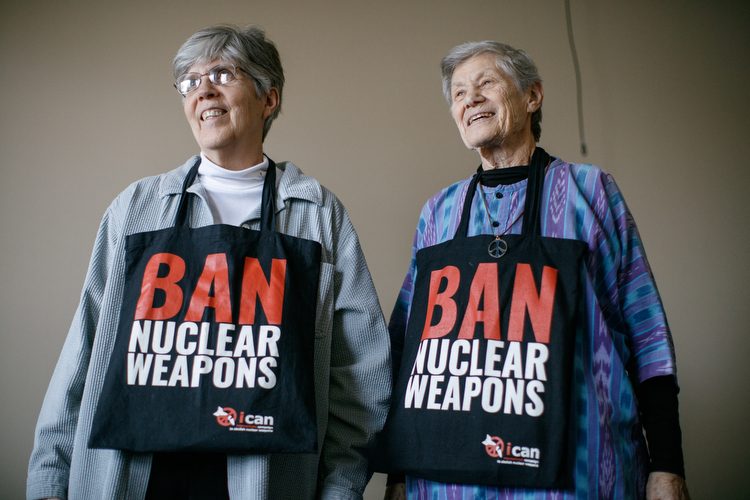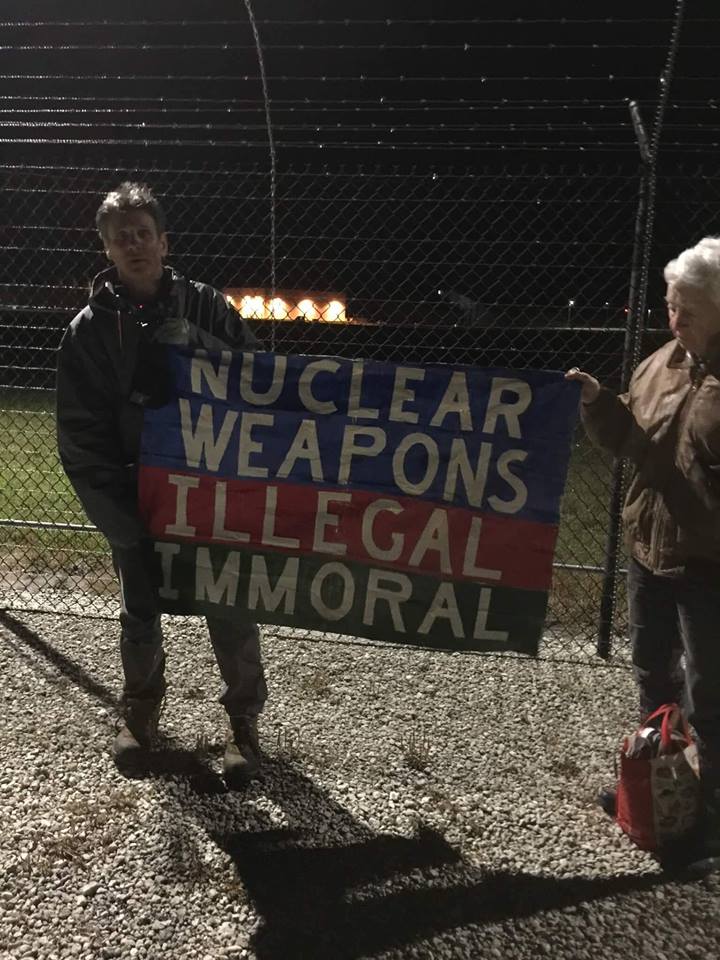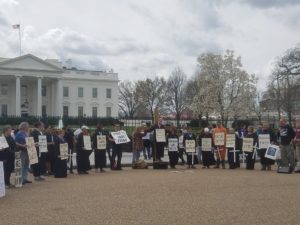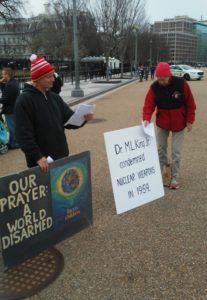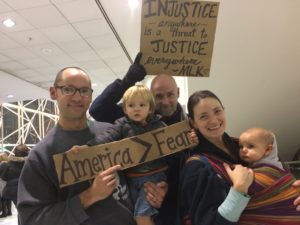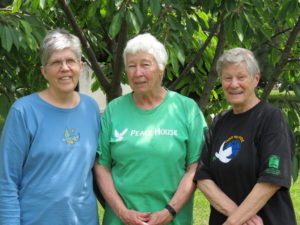Reflection: Peace
By Gary Ashbeck
The stories out of Washington have been frequent, bad, and numerous lately. Big stories seem to be dropping hourly. Indictments, bad policy, chaos, and numerous things contrary to our faith. When I first started to contemplate Advent, this was the influence, but within the last week the pace has picked up. It seems that Christians are the most complicit in sustaining this dark moral travesty. I also feel that we have grown weary and complacent. I personally feel the weariness and darkness inside.
There is but one antidote, I realized: a stronger faith community. Pulling together the flock.
I think there are some people who would be happy to see an upheaval in our government. Many would cheer for an impeachment. I’m not so sure. We are a divided people and I think it would only get darker and more contentious… but the daily onslaught against God’s people must stop.
I don’t know how to say it any stronger, so I’ll just say it again. We need to be celebrating Advent with every ounce of energy in our bodies. We need to celebrate Christmas with every ounce of energy in our bodies. I don’t want to sound hopeless, because I am not. I am feeling light and warmth from the last three Sundays. Hope, love, joy, and now peace. I feel energized that I have been blessed to sit here and share my musings on the Scriptures and delight in our fellowship.
Today we start the week of peace in Advent. It’s a short one, as Christmas is only two days away.
Today Mary will give her testimony. Actually no, I added that. The prescribed readings the church has given us are only the first part, that of Elizabeth shouting out for joy of the coming of Mary to her humble house. She will declare how the baby she was carrying was moved by the presence of the baby Mary was carrying. She will shout out that the messianic promise will come in short order on the shoulders of the baby Mary was carrying. The joy in this scene between Elizabeth with John and Mary with Jesus springs off the pages.
But I refused to stop there because it does not do justice to the total story presented in that scene. Mary then utters what we now call the Magnificat. It is frequently sung as a hymn. This is the longest statement spoken by a woman in the New Testament, a rarity that signals its great importance. The message in the Magnificat is so revolutionary that the British banned it from being sung in churches when they ruled India. Guatemala in the 80s banned public readings or singing of it, and in Argentina the military banned any public display of it during the dirty war. It was banned because it gave people hope that God does not want them to be second class. God demands justice. Before Dietrich Bonhoeffer was executed, he included this in an Advent sermon:
“The song of Mary is the oldest Advent hymn. It is at once the most passionate, the wildest, one might even say the most revolutionary Advent hymn ever sung. This is not the gentle, tender, dreamy Mary whom we sometimes see in paintings.…This song has none of the sweet, nostalgic, or even playful tones of some of our Christmas carols. It is instead a hard, strong, inexorable song about the power of God and the powerlessness of humankind.”
I felt this scene needed proper context and representation, so I went to the Women’s Bible Commentary in a chapter written by Jane Schaberg, and also found some additional material from Reverend Carolyn Sharp of the Yale Divinity School. There was much discussion about how Mary had essentially given herself over to God to carry this child Jesus. She will give herself over to raise this child to adulthood and then she will watch as his message, his messianic promise, gets him executed on the cross as a political dissident, an execution encouraged by people who shared his faith but not his desire to level out power dynamics.
In this moment, Mary is given over to prophecy. Sharp says, “Don’t envision Mary as the radiant woman peacefully composing the Magnificat.” Instead see her as “a girl who sings defiantly to her God through her tears, fists clenched against an unknown future.” She outlines the messianic promise but she comes to it as someone who is the most marginalized, most maligned, and, in being pregnant, risks being stoned.
The Magnificat is not a peaceful message. God has shown might with his arm, dispersed the arrogant of mind and heart. God has thrown down rulers from their thrones. God has lifted up the lowly. The hungry have been filled and the rich sent away empty. Again, from Schaberg: “Mary’s song is precious to women for its vision of their concrete freedom from systemic injustice—from oppression by political leaders on their thrones and by the arrogant and rich. In the transformed social order that is celebrated, food is provided for the hungry. The spiritual realm is understood as embedded in socioeconomic and political reality. Focus is on the might, holiness, and mercy of God, who has promised solidarity with those who suffer, and who is true to those promises. God is magnified for effecting changes—now in history.”
But the Magnificat is a message that should bring about a true peace. The messianic promise that she proclaims and that Jesus will repeat in his first public testimony is a promise of upheaval in the status quo. The testimony is so unpopular that Jesus narrowly escapes the crowds who are so angry that they want to kill him. He disturbed the pseudo-peace in attempting to bring about real peace. Later we will see a similar theme in the Beatitudes. People were angry and tried in many ways to stop Jesus. The message does resonate with the marginalized who want his promise to come and suffering to end. It will continue to cause turmoil until change brings about real peace, not unlike how the actions of Martin Luther King Jr. exposed the violence of the status quo in an effort to bring justice and, with it, peace. The pseudo-peace was destroyed with the violence that he lifted the veil on, but his message resonated with those who were treated as second-class citizens in the United States and began to truly threaten the powers that be when he started to call attention to class struggle before he was assassinated.
So, we remain in the thousands of years’ struggle for the fruition of the messianic promise. As we enter the last week of Advent, we must remember that Advent does not and should not end at Christmas. The status quo is immoral and easy. It doesn’t want to raise a real ruckus when injustice occurs. It enjoys a pseudo-peace. Injustice abounds. The mantle of the messianic promise falls on us to continue on with Jesus’ teaching. It is not easy. We are a curmudgeonly sort, easily influenced to build golden calves. We, like the Maccabees, need to struggle to keep the faith. We must disturb the pseudo-peace. We need to gather in community and stand strong. The lessons we learn in Advent help us to continue the struggle after Christmas is gone.
Just before the Magnificat, Elizabeth finishes her greeting with, “Blessed are you who believed that what was spoken to you by the lord would be fulfilled.” Let’s try to keep hope and believe.
What do the words of the Magnificat mean to you?
How should we continue to celebrate Advent after Christmas?

